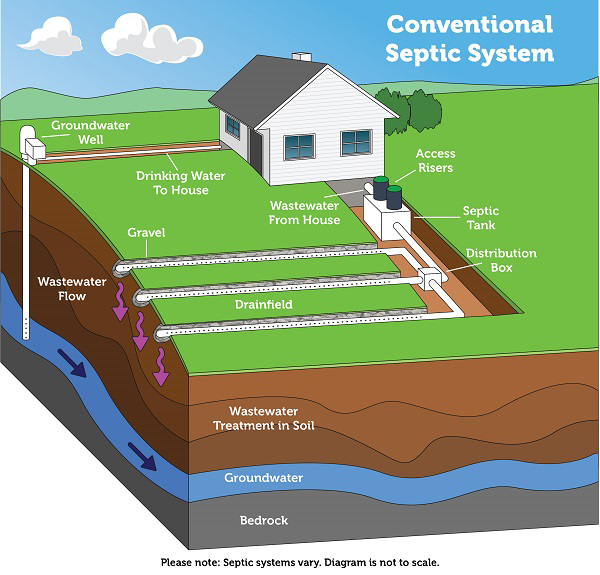OWTS Maintenance for the Homeowner
An Onsite Wastewater Treatment System (OWTS) typically consists of a septic tank and treatment field. It is important to maintain these components to ensure they work properly.
Typical Residential Treatment System

Please note: Septic systems vary. Diagram not to scale. Source: US EPA.
Best Practices For a Healthy Treatment System
- Have your septic tank pumped every 2-4 years (yearly if you use a garbage grinder.)
- The septic tank and the OWTS field should not be driven over with a car or heavy equipment.
- When the septic tank is pumped, have the contractor check the tank baffles to make sure they are in place and not deteriorated. (The baffles keep the solids from entering the sewage field.)
- Never enter your septic tank. Gasses that can be generated in the tank and/or oxygen depletion can be fatal.
- Septic tank additives are not recommended and may harm the OWTS field by breaking up the scum and sludge layer causing them to flush out of the septic tank and clog the pipes of the sewage field system.
- Do not flush cigarette butts, grease, disposable diapers, sanitary napkins, food, transmission oils, paint, paper towels and coffee grounds down the toilet or drains since these items do not readily decompose and could contribute to rapid failure.
- Impermeable objects such as pools, sheds, driveways or house additions should not be placed over your OWTS field system.
- Keep surface water away from your OWTS field. (Redirect house downspouts and sump pump discharge.)
- Shallow rooted plants and grasses are beneficial over a sewage field. Do not plant trees near your sewage system because roots may clog and break pipes. Gardens should not be planted over your sewage field.
- Digging without knowing the location of your OWTS could damage the sewage system. Contact our office to see if we have a map of your OWTS location before you dig. Call Dig Safely New York, 1-800-962-7962 before you dig.
- Rain gutters; storm drains or footer drains should not be connected to your OWTS. The additional water may flood the system.
- Avoid doing several loads of laundry in one day. Water conservation will help prolong the life of your system. Use water saver fixtures when possible.
Resources